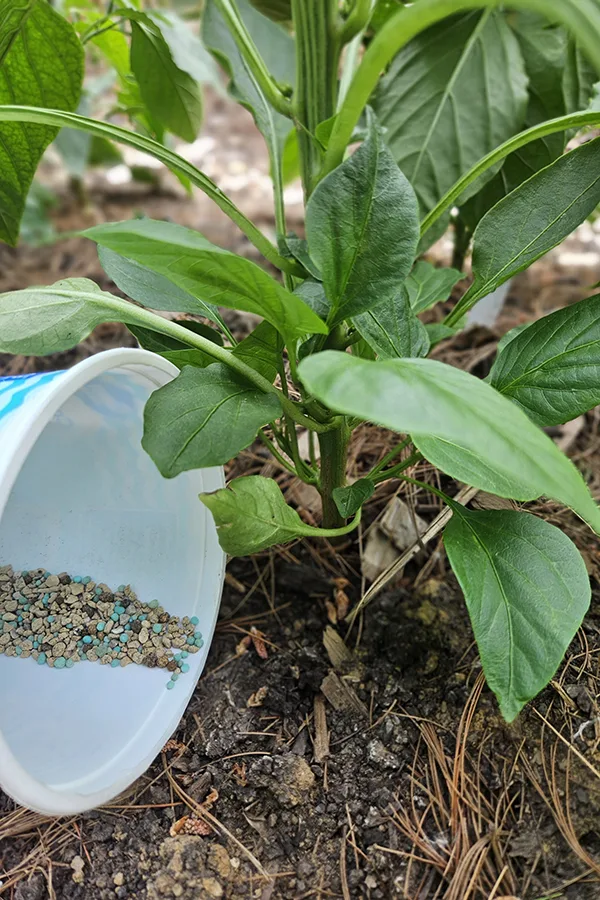Best Fertilizers for Peppers: Maximize Plant Health and Yield
Best Fertilizers for Peppers: Maximize Plant Health and Yield
Blog Article
Organic Vs. Synthetic Fertilizers: Which Is Best for Nurturing Healthy Pepper Plants?
In the world of supporting healthy and balanced pepper plants, the selection between natural and synthetic fertilizers stands as an essential decision with far-reaching implications. While both alternatives purpose to supply vital nutrients to sustain plant growth, the nuances of their effect on the soil, plant health, and the environment trigger a discussion that mirrors throughout the gardening community. Recognizing the unique advantages and potential risks of each plant food type is crucial for pepper farmers seeking to maximize their returns while preserving a sustainable and eco-conscious approach.
Benefits of Organic Plant Foods
Organic fertilizers provide an environmentally-friendly and sustainable technique to nourishing pepper plants, providing necessary nutrients without making use of synthetic chemicals. These all-natural fertilizers are stemmed from organic sources such as compost, manure, bone meal, and seaweed, advertising dirt wellness and biodiversity. Unlike artificial plant foods, natural alternatives launch nutrients gradually, making certain a balanced and constant supply for pepper plants to prosper.
One substantial benefit of organic plant foods is their capacity to improve dirt structure and water retention. By boosting dirt health and wellness, organic plant foods promote beneficial microbial task, which aids in nutrient uptake by pepper plants. In addition, natural plant foods lower the danger of chemical run-off, protecting water sources from pollution and safeguarding the environment.
Additionally, organic plant foods contribute to long-term soil fertility by promoting the growth of useful soil organisms. These organisms assist break down raw material, launching nutrients in a type that is conveniently available to pepper plants. best fertilizers for peppers. By promoting a healthy and balanced soil environment, natural plant foods support lasting pepper farming practices that benefit both plants and the environment
Disadvantages of Artificial Plant Foods
Artificial fertilizers, in contrast to their organic counterparts, posture various drawbacks when utilized to nourish pepper plants, impacting both plant wellness and ecological sustainability. One significant downside of artificial fertilizers is their propensity to seep nutrients from the soil swiftly.
In addition, the overuse of artificial plant foods can add to water air pollution. Excess fertilizers not soaked up by plants can wash away right into water bodies, causing eutrophication, where algae flowers deplete oxygen levels in the water, harming marine life. In addition, synthetic plant foods are normally originated from non-renewable sources, such as fossil gas, adding to carbon exhausts and environmental destruction during their manufacturing.
Nutrient Absorption Contrast
Efficient nutrient absorption plays a critical role in the total health and wellness and development of pepper plants. When comparing artificial and natural fertilizers in terms of nutrient absorption, natural fertilizers have the advantage of offering a much more balanced and slow-release source of nutrients (best fertilizers for peppers). Organic fertilizers have a range of macro and trace elements that are not only helpful for the plants but additionally promote healthy dirt microbial task, which aids in nutrient uptake. On the various other hand, synthetic plant foods commonly supply a quick release of nutrients, which can lead to seeping and runoff, resulting in lower nutrient absorption prices by the plants.
Additionally, natural plant foods boost dirt framework and water hop over to these guys retention capacity, allowing pepper plants to access nutrients much more successfully. This enhanced soil quality facilitates origin development, allowing much better nutrient absorption. Synthetic plant foods, although at first enhancing plant growth as a result of their high nutrient concentrations, may hinder long-term nutrient absorption by degrading soil health gradually.
Ecological Impact Considerations

On the other hand, synthetic fertilizers, although typically more immediately available and concentrated to plants, can have damaging effects on the environment otherwise used correctly (best fertilizers for peppers). Their production needs high power inputs, bring about greenhouse gas discharges and contributing to environment modification. The runoff of excess synthetic plant foods can pollute water sources, leading to eutrophication and harming water ecosystems.
Ideal Fertilizer Practices for Peppers
When feeding pepper plants, enhancing nutrient uptake and decreasing environmental influence are key factors to consider. To attain this, it is important to follow ideal plant food practices customized to the certain requirements of pepper plants. One critical method is to do a soil test prior to using any fertilizers. This examination can determine the pH degree of the soil and identify any type of nutrient shortages, assisting Get More Information you in picking one of the most ideal plant food formulation.
An additional vital technique is to feed pepper plants at the correct time. Normally, peppers benefit from receiving plant food at growing and after that once more when they start to flower. Over-fertilizing can result in nutrient imbalances and hurt the plants, so it is important to follow suggested application prices.
In addition, selecting a balanced fertilizer with an NPK proportion that suits pepper plants' demands is basic. Organic plant foods, such as compost or manure, can be outstanding selections as they release nutrients slowly and enhance dirt structure gradually. Nevertheless, synthetic plant foods can provide a quick nutrient increase when required. Inevitably, integrating synthetic and organic fertilizers carefully can assist support healthy and balanced pepper plants while decreasing ecological impact.
Final Thought

Organic fertilizers offer an environmentally-friendly and sustainable method to nourishing pepper plants, offering crucial nutrients without the use of synthetic chemicals. Unlike synthetic fertilizers, natural options release nutrients slowly, making certain a well balanced and steady supply for pepper plants to flourish.
Artificial plant foods, in comparison to their organic counterparts, position numerous downsides when used to nurture pepper plants, influencing both plant this link health and ecological sustainability. When contrasting synthetic and natural plant foods in terms of nutrient absorption, natural fertilizers have the advantage of providing an extra balanced and slow-release resource of nutrients.Additionally, natural fertilizers enhance dirt framework and water retention capability, enabling pepper plants to accessibility nutrients a lot more effectively.
Report this page